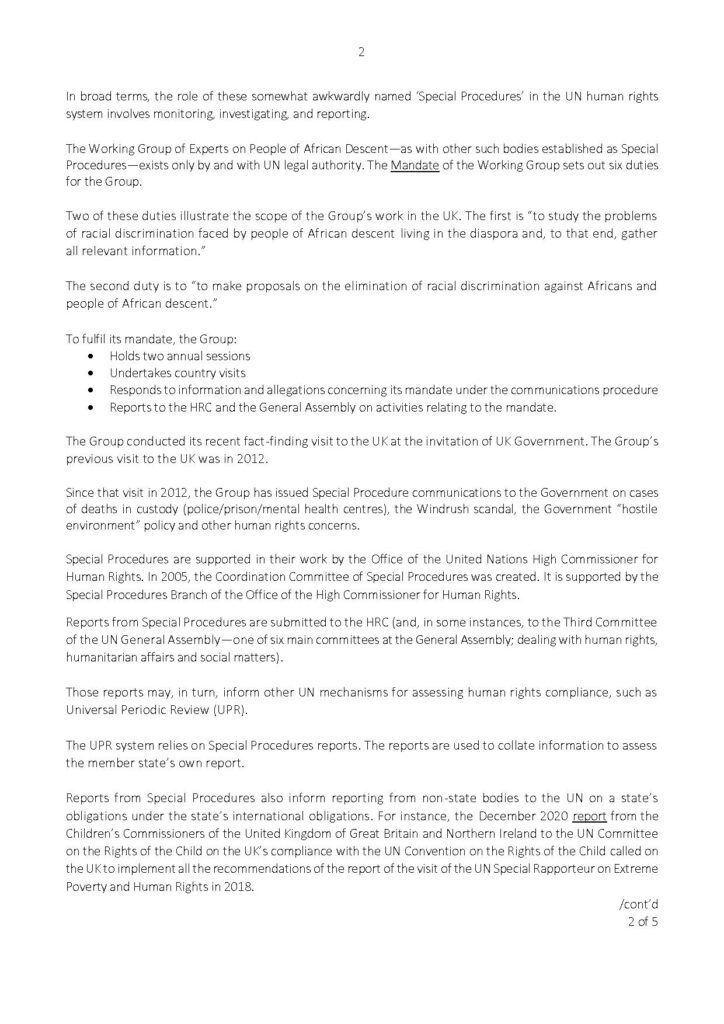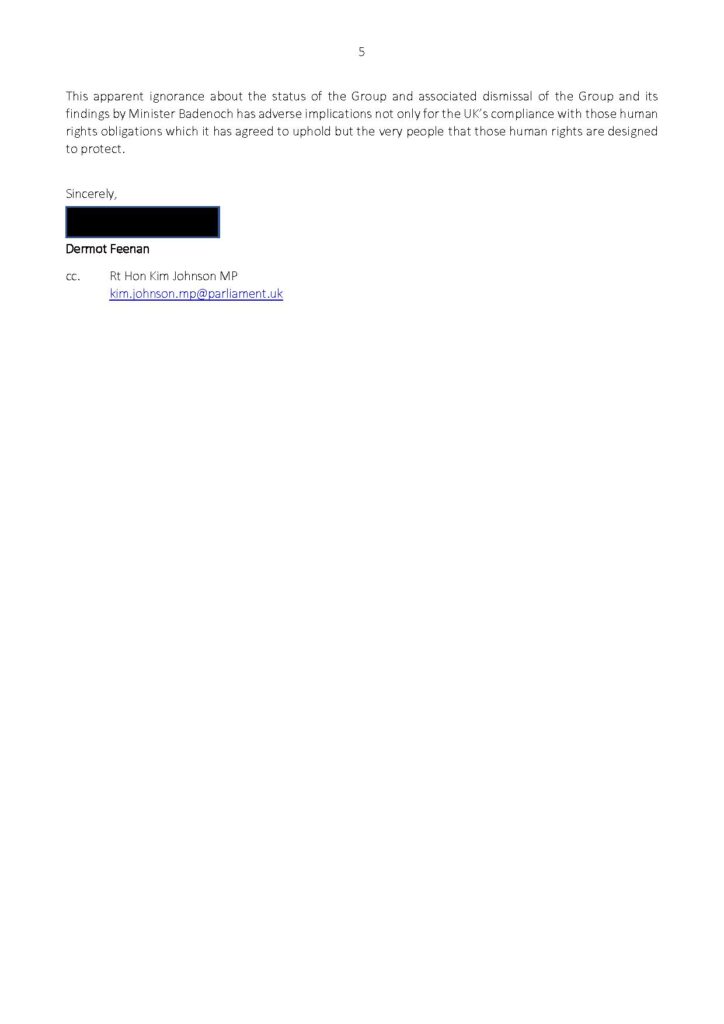6-minute read
Dermot Feenan
LLB MA LLM Barrister-at-Law FRSA
.
Among the many troubling aspects of the performance of the UK’s Equalities Minister Kemi Badenoch before the Women and Equalities Committee of UK’s House of Commons on 1 March, is her misleading communication that the United Nations (UN) Working Group of Experts on People of African Descent is not a ‘formal’ UN body.
Minister Badenoch made the statement during discussion of the Group’s end-of-mission statement following its visit to the UK in January. She criticised the Group’s preliminary findings, before adding that the Group “was not a body that we in this Parliament should be engaging with seriously given some of the claims that they put.”
Committee member Kim Johnson MP countered: “Even though it was a UN Working Group.”
Minister Badenoch’s reply included the following statement: “It’s not, erm, one of the formal…it’s not one of the formal things that’s properly commissioned by the UN.” (This is a verbatim account taken from the live recording of the meeting. The transcript of the meeting published on the Committee’s webpage does not accurately record that statement.)
United Nations Special Procedures
The UN Working Group of Experts on People of African Descent was established in 2002 by the UN Commission on Human Rights resolution 2002/68 (as a Special Procedure). The Group’s mandate was subsequently renewed by the Commission and its successor, the UN Human Rights Council (HRC).
UN Special Procedures mandate-holders are independent human rights experts appointed by the HRC to address either specific country situations or thematic issues in all parts of the world.
The legal basis for the UN Special Procedures was created in 1967.
In broad terms, the role of these somewhat awkwardly named ‘Special Procedures’ in the UN human rights system involves monitoring, investigating, and reporting.
The Working Group of Experts on People of African Descent—as with other such bodies established as Special Procedures—exists only by and with UN legal authority. The Mandate of the Working Group sets out six duties for the Group.
Two of these duties illustrate the scope of the Group’s work in the UK. The first is “to study the problems of racial discrimination faced by people of African descent living in the diaspora and, to that end, gather all relevant information.”
The second duty is to “to make proposals on the elimination of racial discrimination against Africans and people of African descent.”
To fulfil its mandate, the Group:
- Holds two annual sessions
- Undertakes country visits
- Responds to information and allegations concerning its mandate under the communications procedure
- Reports to the HRC and the General Assembly on activities relating to the mandate.
The Group conducted its recent fact-finding visit to the UK at the invitation of UK Government. The Group’s previous visit to the UK was in 2012.
Since that visit in 2012, the Group has issued Special Procedure communications to the Government on cases of deaths in custody (police/prison/mental health centres), the Windrush scandal, the Government “hostile environment” policy and other human rights concerns.
Special Procedures are supported in their work by the Office of the United Nations High Commissioner for Human Rights. In 2005, the Coordination Committee of Special Procedures was created. It is supported by the Special Procedures Branch of the Office of the High Commissioner for Human Rights.
Reports from Special Procedures are submitted to the HRC (and, in some instances, to the Third Committee of the UN General Assembly—one of six main committees at the General Assembly; dealing with human rights, humanitarian affairs and social matters).
Those reports may, in turn, inform other UN mechanisms for assessing human rights compliance, such as Universal Periodic Review (UPR).
The UPR system relies on Special Procedures reports. The reports are used to collate information to assess the member state’s own report.
Reports from Special Procedures also inform reporting from non-state bodies to the UN on a state’s obligations under the state’s international obligations. For instance, the December 2020 report from the Children’s Commissioners of the United Kingdom of Great Britain and Northern Ireland to the UN Committee on the Rights of the Child on the UK’s compliance with the UN Convention on the Rights of the Child called on the UK to implement all the recommendations of the report of the visit of the UN Special Rapporteur on Extreme Poverty and Human Rights in 2018.
The thematic issues addressed by Special Procedures may also be addressed by other UN bodies. This underscores the importance of those themes within the UN human rights machinery. For instance, the UN Special Rapporteur on Contemporary Forms of Racism, Racial Discrimination, Xenophobia and Related Intolerance recommended in her report to the HRC following her visit to the UK in 2018 that the UK “[c]onsider adopting concrete strategies for the elimination of racial discrimination against people of African descent” (para. 74(g)). This recommendation was, in turn, reiterated by the Working Group of Experts on People of African Descent in its end-of-mission statement following its visit to the UK in 2023.
The UN Working Group of Experts on People of African Descent has also been consulted by the UN
Committee on the Elimination of Racial Discrimination, which reports to the UN General Assembly, “to exchange views and information on the current state of affairs and developments regarding the situation of people of African descent in different regions.”
The Special Procedures bodies (Working Groups, Special Rapporteurs, Independent Experts) are described by the UN as “a central element of the United Nations human rights machinery.” They have also been described by Federico Villegas Beltrán, who served as president of the 16th cycle of the HRC, as “the eyes and the ears of the Human Rights Council.”
These Special Procedures bodies carry ‘UN’ in their title. They formally report to the UN. They are governed by procedures of the UN.
The UK is a member of the UN. The UK has ratified UN treaties and is, therefore, subject to concomitant obligations in international law and procedure.
While experts in Special Procedures are not UN staff and do not receive a salary for their work, they do constitute formal bodies operating as part of the UN.
All of the foregoing information about the status of Special Procedures is easily obtainable online. There is also an increasing body of secondary literature on Special Procedures—much of it referenced and readable online— which makes clear the status of Special Procedures within the UN human rights machinery.
Any implication that these are not formal UN bodies is false and misleading.
Ministerial responsibility
Minister Badenoch’s communication to the Committee is, therefore, concerning. She is a minister and is subject to the requirement under the Ministerial Code to “give accurate and truthful information to Parliament, correcting any inadvertent error at the earliest opportunity.”
The Code continues: “Ministers who knowingly mislead Parliament will be expected to offer their resignation to the Prime Minister.”
The Committee of Privileges of the House of Commons also has power according to the rules and procedures which are laid down by the House to determine whether a minister has misled Parliament.
The Committee has recently adopted an approach that distinguishes ‘misleading’ from what is ‘correct’, based on “plain-English definitions”.
The Committee has provided context for the need for Ministers to correct misleading statements, which foregrounds the need for truth, accuracy, and proactive candour:
The expectation is that when the House hears from Ministers, what it hears is the truth as far as the Minister knows it. The House considers legislation and scrutinises government activity on the basis that what it is told is accurate. Parliament expects and requires proactive candour and transparency. This is what is necessary for the House to do its job properly. If a Minister makes an inadvertent error they are expected to correct it at the earliest opportunity. (HC 1203, para. 8)
In addition, the Nolan Principles of Public Life – which apply to all those who hold national or local public office – include the principle of honesty: that “holders of public office should be truthful.”
Minister Badenoch’s failure to convey to a parliamentary committee the correct status of the Working Group suggests, at worst, misleading of Parliament, and, at best, inexcusable ignorance. She should know better. She is the Equalities Minister. She met the Working Group on its latest visit and was made aware of its status.
Moreover, one of the responsibilities of the Government Equalities Office for which Minister Badenoch is responsible is “supporting and implementing international equality measures in the UK, including our international commitments to: the UN Convention on the Elimination of All Forms of Discrimination against Women (CEDAW).”
Those international commitments relating to inequalities and racial discrimination also encompass the International Covenant on Civil and Political Rights and the International Convention on the Elimination of All Forms of Discrimination (and associated reporting to the Committee on the Elimination of All Forms of Racial Discrimination).
Minister Badenoch voluntarily and calculatedly communicated to a parliamentary committee that the UN Working Group on People of African Descent was not a formal UN body. This was not a passing reference. It came after her considered criticism of the Group and its findings.
The proportion of the UK population of African descent is considerable. The UN Working Group on People of African Descent is one of the few international bodies with respected status and authority to comment externally on the status of people of African descent in the UK.
The Equalities Minister’s lack of command of her brief is also notable. Her statement about the status of the Working Group was riddled with vagueness and lack of precision. It is not acceptable for a minister to refer to one of the UN Special Procedures as “not one of the formal things that’s properly commissioned by the UN.”
Minister Badenoch’s use of the word ‘things’ to refer to a formal body within the UN reveals troubling ignorance of the UN system and, in consequence, the UK’s obligations under international law.
Minister Badenoch’s use of the word ‘commissioned’ reveals troubling ignorance of the authority under which Special Procedures operate with UN mandate.
This apparent ignorance about the status of the Group and associated dismissal of the Group and its findings by Minister Badenoch has adverse implications not only for the UK’s compliance with those human rights obligations which it has agreed to uphold but the very people that those human rights are designed to protect.
I have written to Caroline Nokes MP, Chair of the Women and Equalities Committee, cc’d to Kim Johnson MP, the Committee member who asked Minister Badenoch about the Group, with my concerns about the misleading statement by Minister Badenoch to the Committee (see letter, with my personal data redacted, in the Annex below).
Annex





© Dermot Feenan 2023